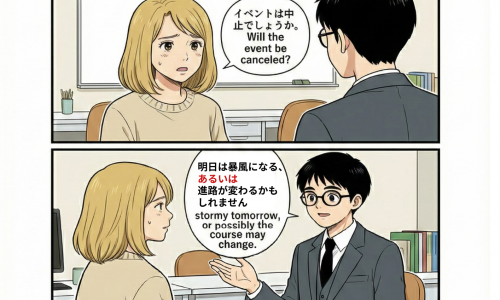- Home
- Blog Archives
Blog Archives
-
【JLPT N2★えない (enai): unable to, cannot】
Meaning: unable to; cannotFormation:Verb-ますstem + 得ない日本語 / に…
-
【JLPT N2★える / うる (eru/uru): can, is possible】
Meaning: can; is possibleFormation:Verb-ますstem + 得る (える/うる)日本語 / にほ…
-
【JLPT N2★どうやら (dou yara): it seems like, it appear…
Meaning: it seems like; it appears that; seeminglyFormation:どうやら + phrase…
-
【JLPT N2★どうせ (douse): anyway, anyhow】
Meaning: anyway; anyhow; in any case; after allFormation:どうせ + phrase&…
-
【JLPT N2★どころではない (dokoro dewa nai): this is not th…
Meaning: this is not the time/occasion for; …is out of the questionFormation…
-
【JLPT N2★でしかない (de shika nai): merely, nothing but…
Meaning: merely; nothing but; no more thanFormation:Noun + でしかない…
-
【JLPT N2★ではないか (dewa nai ka): let’s do something, …
Meaning: let’s do (something); why don’t weFormation:Verb-volitional + ではな…
-
【JLPT N2★だって (datte): because, but】
Meaning: because; but; after all; even; tooFormation:だって + phrase: because, b…
-
【JLPT N2★だけは (dake wa): to do all that one can】
Meaning: to do all that one canFormation:Verb-dictionary form + だけは + (sam…
-
【JLPT N2★だけのことはある (dake no koto wa aru): no wonder…
Meaning: no wonder; it’s not surprising thatFormation:Verb-casual + だけのことは…
-

【JLPT N2★だけに (dake ni)”…being the case, prec…
Meaning: being the case; precisely becauseFormation:Verb-casual + だけにNou…
-

【JLPT N2★だけましだ (dake mashi da): “one should …
Meaning: it’s better than…; one should feel grateful forFormation:Verb-cas…
-

【JLPT N2★だけでなく (dake de naku) “not only… but…
Meaning: not only… but alsoFormation:Verb-dictionary form + だけでなくNoun + …
-

【JLPT N2★だけあって (dake atte) “being the case, …
Meaning: …being the case; (precisely) because; as might be expected fromForm…
-

【JLPT N2★ちっとも~ない (chitto mo~nai)”(not) at al…
Meaning: (not) at all; (not) in the leastFormation:ちっとも + Verb-ないform&…
-

【JLPT N2★ぶりに (buri ni)”for the first time in…
Meaning: for the first time in (period of time)Formation:Noun (measurement…
-
【JLPT N2★ばかり (bakari) : about, approximately】
Meaning: about, approximatelyFormation:Noun (indicates time or distance) +…
-

【JLPT N2★あるいは (aruiwa) “or; possibly”】…
Meaning: or; possiblyFormation:あるいは + Nounあるいは + phrase日本語 / にほんご / Japane…
-

Noboru's English sentences Patterns
May + S + V ~! ~しますように (Mayの倒置:祈願文)
「~しますように」という話し手の祈りの気持ち、願望を表現するときは祈願文を使います。作り方は「May+主語+動詞+その他の品詞!」となります。助動詞を前に出して…
-

【日本語上級(advanced)】接続詞 つまり、要するに
Aすなわち(つまり)Bは、A=Bの意味です。「言い換えれば」ということですね。「すなわち」の方がイコールの意味が若干強いです。ただ「つまり」に関しては、「要約す…





















Recent Comments